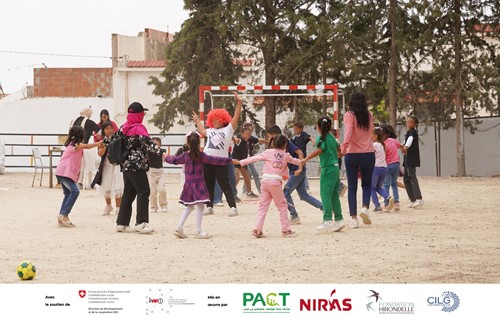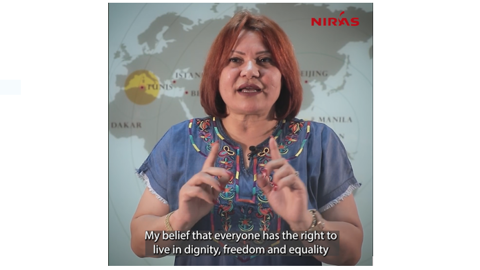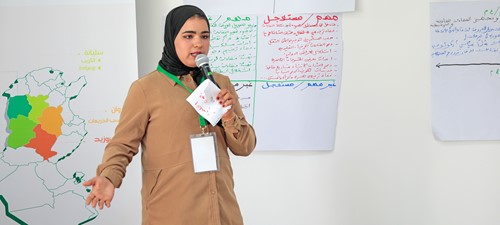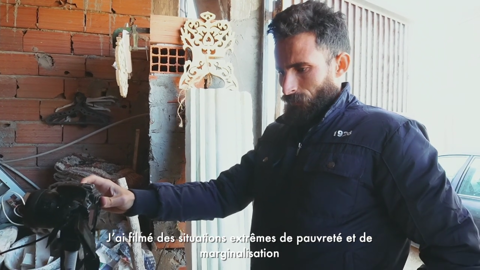Project
Anchoring democratic participation at the local level in a transitioning country

Project
In the wake of Tunisia’s transition to democracy and decentralised government, NIRAS is supporting the establishment of community dialogue mechanisms while training local officials and empowering civil society initiatives in the North African country’s Hautes Steppes region.
Since the largely youth-led revolution of 2011, the formerly autocratic political system of Tunisia has seen remarkable achievements in transitioning towards a democratic form of governance. The adoption of a constitution, two subsequent parliamentary and presidential elections in 2014 and 2019, a new decentralisation law, and electoral law reforms have been key milestones.
This democratic transition was accompanied by a shift to decentralised governance. To this end, the entire territory was divided into municipalities, with the goal of turning these into real actors of local development with full administrative and financial autonomy.
However, this transition has been far from easy. Newly formed administrations in rural areas face deep-rooted challenges, and following 60 years of unequal resource distribution, Tunisia’s 24 regions, or governorates, still experience dramatic disparities. In particular, the governorates in the centre and southwest (the so-called “Hautes Steppes”) are marked by high unemployment, low literacy rates, limited access to infrastructure, and low rates of involvement among the youth and women sectors in local decision-making.
In my role as team leader of PACT, I have seen in practice how community forums are an effective, structured, and inclusive way to exercise local democracy, strengthen accountability, and improve mutual trust and understanding between elected officials and citizens.
Jalila Boukari, PACT Team Leader
It is against this backdrop that the Participation Active des Citoyennes et Citoyens Tunisiens (PACT) programme is making its mark. French for Active Participation of Tunisian Citizens, PACT is funded by the Swiss Agency for Development and Cooperation (SDC). Its first phase ran from 2020 to early 2023 and some of the achievements relating to the programme’s key objectives include:
A new second phase was launched in May 2023, thanks to the achievements of phase 1. The overall objective of phase 2 is to contribute to the improvement of the living conditions of the population, in particular the most vulnerable populations, at the local level in the region of the haut steppes.
The project will be implemented in three cycles staggered over time in order to capitalise on the lessons learned from each cycle for those that follow.
As in phase 1, PACT continues to work to increase the participation of citizens, especially women, youth and the media, in matters of governance at the local level through a multi-stakeholder approach supported by an organised and structured community with enhanced civic engagement. Community forums were envisioned as appropriate spaces for integrating civil society, the media, and local administrations into a process of constructive dialogue. In phase 1, 18 sessions were held throughout the partner municipalities, with a total of 1,590 citizen participants. These community forums were instrumental in the development and monitoring of several projects:
In phase 2, communities supported by the project, civil society, the media and relevant public actors collaborate to diagnose the visible and non-visible problems of the community and develop a response in the form of a Community Development Framework (CDF).
PACT co-finances part of the actions identified in the CDF and supports the community and its partners in carrying out communication and advocacy actions with a view to raising awareness among public actors and mobilising funds to finance other actions.
Through its intervention approach, PACT 2 aims to create an environment conducive to multi-stakeholder collaboration, which is based on mutual trust so that citizens, especially the most marginalised (women, young people, people with disabilities, NEET, etc.), can express their opinions and be heard (Leave No One Behind). Devolved and decentralised administrations will provide better services and demonstrate greater responsibility and accountability, and citizens will gain confidence in local public action and will be willing to contribute to it.
A recent successful CSF example is the Boujrida primary school redevelopment project, located in the community of Zaafrane. A genuine community initiative was developed, mobilising the efforts of citizens, pupils, local residents and the regional authorities involved. The aim was to provide the pupils of the Boujrida school with a welcoming and stimulating educational environment, conducive to their success.

Watch this video (in French) to learn more: Mini projet_Zaafrane_English.mp4.
In phase 1, PACT aimed to improve the capacity of elected officials and staff in the pilot municipalities to apply good local governance, with an eye toward fostering participation, transparency, and accountability. The PACT team conducted a total of 25 training activities in relation to these principles. All in all, the team was able to train 252 elected officials and staff, 32% of whom consisted of women.
This training encouraged local administrations to establish solid lines of communication with their constituencies. A number of pilot municipalities published rules of conduct on their Facebook pages to affirm their commitment toward respectful and appropriate communication with citizens.
A more lasting result of this far-reaching result of PACT’s training was the development of e-learning platform “Academy of Municipalities”. Designed as a comprehensive guide for local elected officials, the knowledge it contains is envisioned to spread out and take effect past the pilot municipalities toward all 350 municipalities of Tunisia.

citizen participated in community forums
journalists trained to cover decentralisation efforts (Fondation Hirondelle)
elected officials and staff joined 25 trainings
Key lessons learned
A couple of important lessons emerged from PACT 1.
At the culmination of iphase 1, PACT led to promising outcomes for the pilot municipalities. The community forums increased the involvement of citizens in making decisions relating to municipal projects, giving them a closer sense of co-responsibility. Conflict management trainings improved the quality and management of the community forums and helped to establish better rapport between municipal authorities and the communities they serve.
On the other end, elected officials also significantly improved their internal and external communication mechanisms. They have come to understand the benefits of listening to the citizens from many different sectors, and of communicating the progress and work done on their projects.
An empowered local media has also served to increase the transparency of municipal work and to give citizens access to information. This has helped to foster a culture of accountability in local governance.
All in all, the PACT programme continues to help create a stronger climate of trust between citizens and elected officials in the pilot municipalities. For a country in the middle of a democratic transition, these municipalities stand at the forefront as models of effective participatory governance on the local level.


Download the project brief

